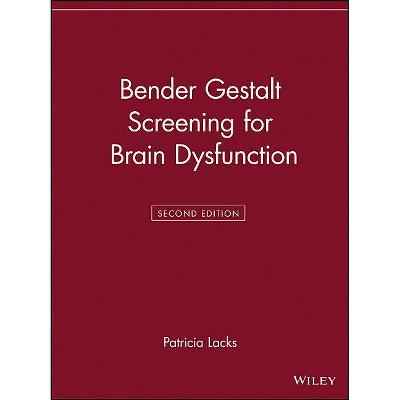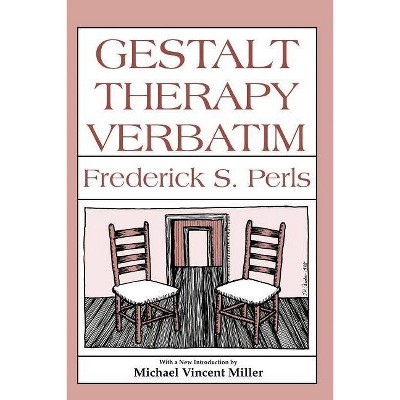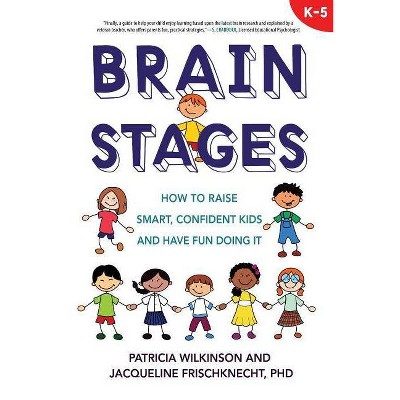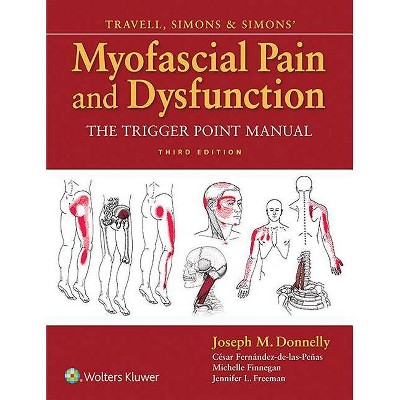Bender Gestalt Screening for Brain Dysfunction - 2nd Edition by Patricia Lacks (Paperback)

Similar Products
Products of same category from the store
AllProduct info
<p/><br></br><p><b> Book Synopsis </b></p></br></br>Reviews of the First Edition . . . <p/> This is the first major manual on Bender Gestalt testing in over30 years, and includes detailed administration and scoringinstructions, and data on validity and reliability.--Epilepsia. <p/> This book will provide both psychologists and psychiatrists [with]a comprehensive yet easy-to-use manual for screening braindysfunction. --Contemporary Psychiatry. <p/> Dr. Lacks should be complimented for her treatment of the use ofthe BGT in screening for organic brain dysfunction. --Book Reviewsin Neurosciences. <p/> Utilized for over 60 years by clinicians worldwide, the BenderGestalt Test (BGT) today continues to be a widely used assessmenttool to measure the cognitive domain of visuoconstructive abilitiesand to screen for brain dysfunction. Much of the BGT's popularityrests on its brevity, simplicity, and proven effectiveness withindividuals from age 4 to 100. The test is often employed ininpatient psychiatric settings because of its ability todiscriminate between brain impairment and serious mental disorderslike schizophrenia. More recently, the BGT has also been used toidentify older adults at high risk for cognitive decline. <p/> This Second Edition is fully revised and includes an up-to-datereview of the relevant scientific literature on the test'sreliability, validity, and diagnostic accuracy. The book alsocontains additional normative data, a discussion of malingering, and almost all new examples and practice case materials. Five newchapters address issues in neuropsychological screening, eightsteps to interpretation of test results, and use of the BenderGestalt Test with children, adolescents, and older adults. <p/> The book serves as a comprehensive manual for the administration, scoring, and interpretation of the Bender Gestalt Test. Thediagnostic significance of general and specific behavioralobservations is stressed and a format for recording them isincluded. For scoring, there are descriptions and multiple exampleswithin the author's adaptation of the 12 errors of the Hutt andBriskin scoring system. The reader can use the 12 varied clinicalcase examples with explication of the scoring and 10 additionalpractice cases to gain rapid scoring facility and accuracy. Normsare provided for adult non-patients and psychiatric inpatients, nonpatient and demented older adults, and adolescents. <p/> Designed for practical use and adhering to APA standards for testmanuals, Bender Gestalt Screening for Brain Dysfunction is acomprehensive and easy-to-use manual that will enable psychologyclinicians, psychometricians, and graduate students to increasetheir level of diagnostic accuracy in screening for brain damage.<p/><br></br><p><b> From the Back Cover </b></p></br></br>Reviews of the First Edition . . . <p>This is the first major manual on Bender Gestalt testing in over 30 years, and includes detailed administration and scoring instructions, and data on validity and reliability. --Epilepsia.</p> <p>This book will provide both psychologists and psychiatrists [with] a comprehensive yet easy-to-use manual for screening brain dysfunction. --Contemporary Psychiatry.</p> <p>Dr. Lacks should be complimented for her treatment of the use of the BGT in screening for organic brain dysfunction. --Book Reviews in Neurosciences.</p> <p>Utilized for over 60 years by clinicians worldwide, the Bender Gestalt Test (BGT) today continues to be a widely used assessment tool to measure the cognitive domain of visuoconstructive abilities and to screen for brain dysfunction. Much of the BGT's popularity rests on its brevity, simplicity, and proven effectiveness with individuals from age 4 to 100. The test is often employed in inpatient psychiatric settings because of its ability to discriminate between brain impairment and serious mental disorders like schizophrenia. More recently, the BGT has also been used to identify older adults at high risk for cognitive decline.</p> <p>This Second Edition is fully revised and includes an up-to-date review of the relevant scientific literature on the test's reliability, validity, and diagnostic accuracy. The book also contains additional normative data, a discussion of malingering, and almost all new examples and practice case materials. Five new chapters address issues in neuropsychological screening, eight steps to interpretation of test results, and use of the Bender Gestalt Test with children, adolescents, and older adults.</p> <p>The book serves as a comprehensive manual for the administration, scoring, and interpretation of the Bender Gestalt Test. The diagnostic significance of general and specific behavioral observations is stressed and a format for recording them is included. For scoring, there are descriptions and multiple examples within the author's adaptation of the 12 errors of the Hutt and Briskin scoring system. The reader can use the 12 varied clinical case examples with explication of the scoring and 10 additional practice cases to gain rapid scoring facility and accuracy. Norms are provided for adult non-patients and psychiatric inpatients, nonpatient and demented older adults, and adolescents.</p> <p>Designed for practical use and adhering to APA standards for test manuals, Bender Gestalt Screening for Brain Dysfunction is a comprehensive and easy-to-use manual that will enable psychology clinicians, psychometricians, and graduate students to increase their level of diagnostic accuracy in screening for brain damage.</p><p/><br></br><p><b> About the Author </b></p></br></br>PATRICIA LACKS, PhD, has been a faculty member of the Psychology Department at Washington University in St. Louis for 20 years and has published numerous journal articles and chapters in the area of psychological assessment and treatment evaluation. Since retiring in 1991, Dr. Lacks has taught at several local universities in Santa Barbara, California, and currently provides clinical services at the Sleep Disorders Center of Santa Barbara.
Price History
Price Archive shows prices from various stores, lets you see history and find the cheapest. There is no actual sale on the website. For all support, inquiry and suggestion messagescommunication@pricearchive.us




















